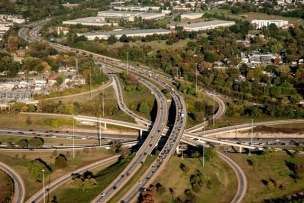 Interstate 440 at Nashville will be widened to six lanes and repaved.
Interstate 440 at Nashville will be widened to six lanes and repaved.The Tennessee Department of Transportation believes it could shave two or more years off the reconstruction of Interstate 440 at Nashville if it closes road segments rather than following traditional construction methods.
TDOT says it plans to explore an option in which only one segment of the southern loop around the city could be closed at any time. It says this could not only lead to the project being completed in less than a year but also significantly reduce the traffic backups caused if lanes were closed along the entire project’s length as is traditionally done.
“Preliminary traffic models have shown that reducing I-440 to two lanes in each direction for a three-year period would result in near-constant heavy traffic queues on I-440 and dramatically increase congestion on surrounding routes,” TDOT says.
TDOT wants the road rebuilt in two segments. The first segment, between I-65 and I-24, could be closed beginning in January and could not be closed longer than three months, according to TDOT’s criteria for the project. The second segment, between I-65 and I-40, could be closed only after the first segment is completed. The second segment must be opened by mid-November 2019. The contractor would face penalties of $400,000 for each day the road opening is late.
The agency is awaiting design-build proposals – which combine design, permit approvals, utility relocation and construction into a single contract – from four teams that it will pick from for the project. Proposals are due in July, with a contract expected to be awarded in August. Construction is scheduled to begin in November.
The project involves removing deteriorated concrete and replacing it with asphalt and widening 7.6 miles of the corridor from four to six lanes to reduce congestion and improve safety, TDOT says. The loop was built in 1987 to handle 64,000 vehicles a day, but currently averages 100,000 vehicles daily.










